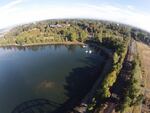
A cove along the Willamette river, in the Portland Harbor Superfund site.
Travis Williams / Willamette Riverkeeper
The Trump administration has a new plan for the Portland Harbor Superfund site that Oregon officials say could reverse progress toward cleaning up toxic pollution in the Willamette River.
Oregon environmental regulators and officials with the city of Portland have sent letters to the U.S. Environmental Protection Agency expressing their concerns about a draft agreement between the EPA and some of the companies responsible for cleaning up the site.
The agreement would require redoing complicated environmental studies and investigations, they say, which would delay a process that has already taken more than 16 years.
Furthermore, they say the EPA left key state and tribal leaders out of the negotiations and may have violated previous agreements.
Just before President Donald Trump took office this year, the EPA released a plan calling for a $1 billion cleanup involving dredging and covering contaminated soil along a 10-mile stretch of the Willamette River known as the Portland Harbor Superfund site.
Oregon Gov. Kate Brown released a statement Monday morning calling the new agreement "a significant setback" to those cleanup plans that could have impacts on Oregon's economy and the long-term health of the environment.
"We must move forward with the cleanup of the Portland Harbor, but the federal administration’s latest direction to the EPA undermines the progress we’ve made," she said. "I urge the EPA to honor its commitment to work collaboratively and transparently with the state, city, and all responsible parties that have long worked toward a thorough and cost-effective clean up of the Portland Harbor.”
In a letter sent Thursday, Oregon Department of Environmental Quality Director Richard Whitman told the EPA that after seeing a draft of an unexpected new agreement last week, his agency has "significant concerns" about how it was developed and the plans it lays out.
The agreement appears to be designed to question the underpinning of the clean-up plan completed under the Obama administration, he wrote, “potentially leading to significant additional delays in the implementation of any remedy.”
He threatened to file a dispute unless the agency includes the state in a formal consultation.
Portland Mayor Ted Wheeler sent a letter Friday echoing the DEQ's concerns and telling the EPA that the city is "deeply troubled" that key stakeholders were excluded from negotiations.
Wheeler said in contrast to what the EPA told the public was supposed to happen next at Portland Harbor, “the draft work plan reopens and reanalyzes decisions that were already made through a lengthy and intensive process.”
The existing cleanup plan doesn’t require repeating investigations and studies, Wheeler argued.
“We appreciate and share the EPA’s goal to move implementation forward as quickly as possible,” he wrote, “but fear that the objectives described by DEQ in the draft agreement could steer the site off-course and even take implementation backward.”
It’s unclear which of the dozens of potentially responsible parties are included in the agreement. The EPA has yet to comment on the purpose of the agreement and who is involved.
Travis Williams, executive director of Willamette Riverkeeper, said his group and others are looking into whether the agreement is legal, but it seems to be "on the very edge of legality" from what he's seen so far.
"I think a lot of us had concerns about the Trump administration with regard to Superfund, and if these letters reflect what is going on in this process it is exceedingly concerning for anybody who cares about the fate of the Willamette River," he said. "Hopefully this is something that will be perhaps changed in the months ahead."
Bob Sallinger, conservation director with the Portland Audubon Society, said the new agreement would “gut” the decision to proceed with the cleanup and trigger “a complete do-over.”
“This is unprecedented,” Sallinger said. “It’s really the worst-case scenario – the nuclear option. They’ve turned the process on its head.”
The new agreement would require revisiting all aspects of the cleanup plan, he said, starting with retesting the soil for contamination.
“They want to use the sampling to redo the whole process,” he said. “It’s incredible that after all this work we’re going to take sampling and use it to redo everything we’ve already done.”
The cleanup process was set to proceed toward assigning responsibility to individual parties, but Sallinger said the agreement would suspend that allocation process and leave the river polluted for many more years to come.
The draft agreement also leaves out input from thousands of people who commented in on the existing cleanup plan, he said.
“It rips the rug out from under everybody,” he said. “I think this community is going to come completely unglued.”
According to Whitman’s letter, the EPA’s draft agreement calls for updating the standards for how much fish people can safely eat from the Portland Harbor Superfund site – a key measure of how contaminated the site is and what it will take to clean it up. It also aims to “reset achievable remedy targets/actions” in the existing record of decision for the cleanup.
“It is inappropriate to be assuming at this time … that the EPA will be resetting these key aspects of the record of decision,” Whitman wrote.
The draft doesn’t provide funding for the state to regulate the cleanup, he noted, and it calls for re-testing for contaminants in locations that “do not appear to be appropriate” because many would be outside the Superfund site, “leaving major gaps in data collection within the site itself.”
That would make it harder to determine whether the cleanup was effective, he noted.
Whitman encouraged the EPA to stick with the existing cleanup plan and asked to be formally consulted before the agreement is finalized. If that doesn’t happen, he wrote, the state will file a dispute.
“We value our close working relationship with EPA on this project,” he wrote, “and trust that such an action will not be necessary.”
